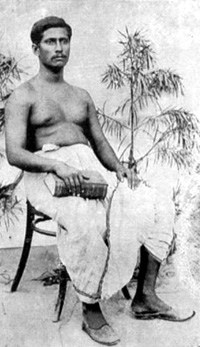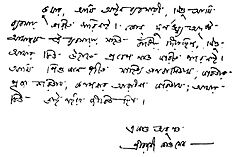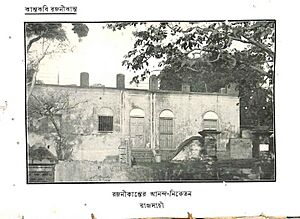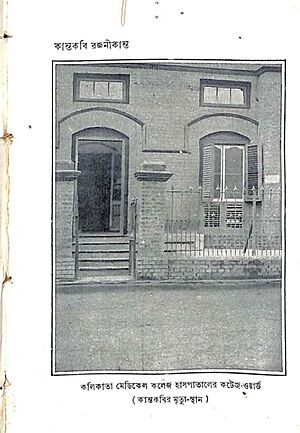Rajanikanta Sen facts for kids
Quick facts for kids
Rajanikanta Sen
|
|
|---|---|

Rajanikanta Sen
|
|
| Native name |
রজনীকান্ত সেন
|
| Born | 26 July 1865 Bhangabari, Belkuchi, Sirajganj District, British India |
| Died | 13 September 1910 (aged 45) Calcutta, Bengal Presidency, British India |
| Occupation | Lawyer, Lyricist, Music composer, Singer |
| Language | Bengali |
| Nationality | British Indian |
| Genre | Song, Poems |
| Literary movement | Bengal Renaissance |
| Notable works | Kantageeti, Bani, Kalyani, Amrita |
Rajanikanta Sen (born July 26, 1865, died September 13, 1910) was a famous Bengali poet and music composer. People also knew him as Kantakobi. He was well-known for his songs about devotion (called bhakti songs) and his patriotic songs that inspired people.
Contents
Rajanikanta Sen's Early Life and Education
Rajanikanta was born in a village called Bhangabari in the Sirajganj area of Pabna district. This place is now in Bangladesh. He was the third child of Guruprasad Sen and Manomohini Debi. Rajanikanta's sister, Ambuja Sundari Dasgupta, was also a well-known poet.
His family originally came from Sahadevpur village in Bangladesh. Rajanikanta's grandfather, Golaknath, did not get much schooling because his family didn't have a lot of money. However, he made sure his two sons, Govindanath and Guruprasad, got the best education.
Rajanikanta's father, Guruprasad, studied law and became a sub-judge. He worked in many parts of Bengal before he retired. Rajanikanta was born when his father was working in Katwa.
School and College Days
Rajanikanta started school at Boalia Zilla School, which is now called Rajshahi Collegiate School. He learned Sanskrit during his school holidays from a neighbor. He had a great teacher named Gopal Chandra Lahiri.
In 1882, he passed his Entrance Examination from Coochbihar Jenkins School. After that, he moved to Calcutta (now Kolkata). He continued his studies, passing his FA exam in 1885 and getting his BA degree in 1889. He then earned his BL (law) degree in 1891 from Kolkata City College.
His Work as a Lawyer
After finishing his law studies, Rajanikanta started working as a lawyer in Rajshahi. His uncle, Govindanath, was also a lawyer there. Rajanikanta quickly became well-known for his legal work.
However, his true passion was for music, writing, and acting. His friends, like the historian Akshay Kumar Maitreya, and his wife supported him in these interests. He also worked for a short time as a Munsif (a type of judge) in Natore and Naogaon.
Rajanikanta's Love for Music
Rajanikanta's father, Guruprasad, loved poetry and music. He even wrote songs about gods like Vaishnab and Shiva-Durga. His father collected old Vaishnava songs and put them into a book. Rajanikanta's mother, Manomohini Devi, also loved Bengali literature and often talked about it with young Rajanikanta. All these things greatly influenced his own writing and music later on.
Rajanikanta became very interested in music because of his friend, Tarakeshwar Chakrabarty. From a young age, he was good at writing poems in both Bengali and Sanskrit. Later, he started composing music for his poems and singing them while playing instruments. His poems were published in local magazines. He often wrote songs for college events very quickly.
For example, he once wrote this song in just one hour for an event at the Rajshahi library:
|
তব, চরণ নিম্নে, উৎসবময়ী শ্যাম-ধরনী সরসা; |
|
Rajanikanta's Family Life
After his father retired, Rajanikanta's family depended on his uncle's sons for money. But sadly, both of them died suddenly in 1878. Rajani's younger brother also passed away. This caused the family to face money problems. Rajanikanta had to study and practice law to help his family. However, he wrote in a letter that he didn't really like being a lawyer.
In 1883, he married Hiranmayee Devi. She encouraged him with his poetry and sometimes gave him ideas for his poems. They had four sons: Shachindra, Gnanendra, Bhupendra, and Kshitindra. They also had two daughters: Shatadalbasini and Shantibala. Sadly, Bhupendra died when he was very young. Rajanikanta's strong belief in God is clear in a song he wrote the day after his son's death:
|
তোমারি দেওয়া প্রাণে তোমারি দেওয়া দুখ, |
|
Rajanikanta's Impact on Bengali Music and Literature
Rajanikanta's songs can be put into four main groups:
- Devotional (about God)
- Patriotic (about his country)
- Humanitarian (about kindness to people)
- Satire (funny songs that make a point)
Patriotic Songs and the Swadeshi Movement
On August 7, 1905, a big meeting was held in Calcutta to protest against the Partition of Bengal. Leaders decided that people should stop buying British goods and use Indian-made (Swadeshi) items instead. Indian clothes were not as fine as British ones, which made some people unhappy.
Because of this, Rajanikanta wrote a very famous song:
|
মায়ের দেওয়া মোটা কাপড় মাথায় তুলে নেরে ভাই; |
|
This song became very popular across Bengal. It greatly inspired people involved in the Swadeshi movement and later, Indian freedom fighters. He wrote another popular song with a similar message:
|
আমরা নেহাত গরীব, আমরা নেহাত ছোট,- |
|
His Published Works
Rajanikanta published three books during his lifetime: Bani (1902), Kalyani (1905), and Amrita (1910). A book about Bengali songs, published in 1905, praised Rajanikanta for his works Bani and Kalyani, and said he was very good at writing funny songs.
After he passed away, five more collections of his works were published. These included Avoya (1910), Anandamayi (1910), Bishram (1910), Sadbhabkusum (1913), and Shesdan (1916). Bani and Kalyani are collections of his songs. Amrita contains short poems meant to teach good values to children. He was inspired by Rabindranath Tagore's Kanika for these poems. He started writing funny songs after meeting poet Dwijendralal Ray in Rajshahi.
Rajanikanta's most important contribution to Bengali literature and music was his beautiful devotional songs. These songs were set to Hindustani classical music styles, mixed with Kirtan, Baul, and Tappa. He became known as Kantakabi, and his songs are often called Kantageeti.
Rajanikanta's Songs in Movies
Many of Rajanikanta's songs have been used in Bengali films. Here are a few examples:
| Year | Song | Artist | Director | Movie |
|---|---|---|---|---|
| 1966 | Tabo charana nimne utsobmoyee | Manna De | Pijush Basu | Subhas Chandra |
| 1976 | Keno bonchito habo charane | Arundhati Mukherjee | Tapan Singha | Harmoniam |
| 1976 | Tumi nirmala karo | Haimanti Shukla | Manu Sen | Mohan Baganer Meye |
| 1999 | Tumi nirmala karo | - | Prabhat Roy | Tumi Ele Tai |
| 2000 | Tumi nirmala karo | Ravi Kinagi | Josh |
Rajanikanta's Role in the Indian Freedom Movement
The Indian National Movement, especially the Swadeshi movement, had a big effect on writers and poets. Famous poets like Rabindranath Tagore, Dwijendralal Roy, and Rajanikanta helped the movement with their patriotic poems and songs. People greatly respected their contributions.
Rajanikanta was very close to Jaladhar Sen. Jaladhar Sen shared a story about Rajanikanta:
"It was the peak of the Swadeshi movement. One day at 1 PM, I was sitting in the Basumati office when Rajani (Rajanikanta Sen) and Akshay Kumar (Akshay Kumar Maitreya), son of the respected Harakumar of Rajshahi, arrived. Rajani had just reached Kolkata at 11 AM by the Darjeeling mail and was staying at Akshay Kumar's mess. The boys at the mess were pressing him to write a song. Rajani loved writing songs, so he immediately sat down to write. He wrote the first part and a stanza, then stood up. Everyone was eager for the song; he said, 'The song is done, now let's go to Jalada's place. Let the song be composed on one side, and written on the other.' I looked and asked, 'Where's the rest?' Rajani said, 'Compose this much, the rest will be done.' Truly, the composition began, and on the other side, the song was finished. Akshay and I set it to music. The song was printed. What excitement there was among the boys because of this song! This patriotic song touched everyone's heart."
This song was "মায়ের দেওয়া মোটা কাপড় মাথায় তুলে নে রে ভাই" (Mayer deoa mota kapor mathay tule ne re bhai), which means "My brothers, please accept the coarse clothing offered by your mother."
Rajanikanta's Last Days
In 1909, Rajanikanta started having problems with his throat. On September 10, he had to move to Calcutta with some family members. A British doctor examined him and said it was throat cancer. He saw many doctors in Calcutta, but he didn't get better.
As a last hope, he spent a couple of months in Varanasi, hoping for a miracle. He had to sell the rights to his published books, Vani and Kalyani, to pay for the trip. But his condition got much worse, so he had to return to Calcutta.
On February 10, 1910, he had an operation called a Tracheotomy at Calcutta Medical College. He survived the operation but lost his voice forever. He spent the rest of his life in a special ward at the hospital. Some students from the Medical College and other poetry lovers helped take care of him. Rich people like Maharaja Manindra Chandra Nandi also helped him with money.
Rajanikanta wrote in his diary regularly while in the hospital. He also started writing his life story, but only finished the first chapter. On June 11, 1910, Rabindranath Tagore visited him in the hospital. Rajanikanta's son and daughter sang one of his songs, and he played the harmonium. He wrote this song on the day Rabindranath Tagore visited him:
|
আমায় সকল রকমে কাঙ্গাল করেছে, গর্ব করিতে চূর, |
|
To thank Tagore for his visit, Rajanikanta wrote him a letter and another poem. Tagore wrote back on July 30, praising Rajanikanta's writing talent. Rajanikanta also wrote some Agamani-Vijaya songs during this time. He passed away on September 13, 1910, in Kolkata.
Rajanikanta's Legacy
- Many singers from India and Bangladesh have recorded Rajanikanta's songs over the years. These include famous artists like Manna Dey, Hemanta Mukhopadhyay, and Aarti Mukherji.
- A statue of Rajanikanta Sen has been placed in Hedua Park, Kolkata, to honor him.
- A public library, "Kabi Rajanikanta Smriti Songsod O Pathagar," is planned to be built in his birthplace, Bhangabari Village in Bangladesh.
 | Delilah Pierce |
 | Gordon Parks |
 | Augusta Savage |
 | Charles Ethan Porter |












